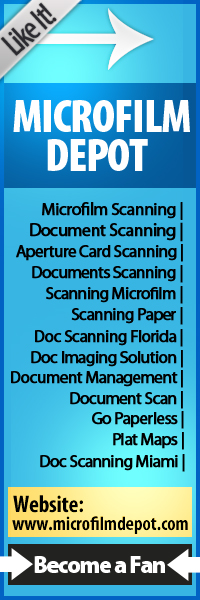Advanced Imaging Solutions / The Microfilm Depot
Document And Microfilm Scanning Service
Since 1984
Call Chris Ferrer For A Free Test And Quote 786-985-2047
10200 State Road 84 #228 Davie Florida 33024
sales@mdepot.com
Microfilm Microfiche Conversion
By Chris Ferrer
People and business entities do not have to be worried about their information being lost in the long dark hallways of history anymore. Important documentation, regardless of its age, can now be recovered and digitized in such a way as to be useful in this increasingly digital workplace. All of the knowledge of years gone by can now be captured and stored digitally through the process of microfilm conversion.
Microfilm is a medium through which large quantities of information can be stored by means of very small photographs which are then imprinted on 35mm or 16mm film. Microfilm conversion is the discipline which concerns itself with the reverse of the reduction process. It also takes it one step further, allowing the owners of the captured information to view and utilize their information through most forms of digital business tools.
A man by the name of John B. Dancer was one of the early pioneers to manufacture micro-photographs. The reduction ratio that he was able to produce was 160:1. Although he only saw his efforts as a hobby, he made his process perfect with the use of information received through the research of one Frederick Scott Archer. Interestingly, the Dictionary of Photography stated in 1858 that these findings were “somewhat trifling and childish”. Had they but had the vision of the pioneers.
James Glaisher was the first person to suggest the utilization of micro-photography as a means of storing large volumes of information safely. He suggested this in 1853.
The main benefit of microfilm conversion is that it frees up all of the office or storage space that was previously needed to store the film. This has a great advantage. Information is not as vulnerable to theft as it used to be, and businesses can scale down their rental agreements and save large quantities of money.
The digitizing of information that was previously stored in microfilm format has great implications for the research community as well. All of the outdated microfilm viewing technologies are redundant, but as the age of personal computers expands, much more history and information recaptured in the digital cloud.
Using applications such as most common photo viewers, as well as text readers to access the converted material makes for super advances in efficiency and economy of time and effort. Converted material can be accessed, printed, distributed in innumerable ways that were not possible for this medium in the past, due to the cumbersome nature of the equipment.
The services of this kind that are available today create the possibility for any entity, personal or business, to render and keep any or all of its past documentation and informative resources. This includes all formats such as contracts, manuals, research, films, photographs, sketches, paintings and many more.
Cataloging of information in a unique fashion allows consumers to store even large quantities of film, without the tedium of having to sit through hours of footage in order to find a specific cut. This feature in itself has to be one of the greatest advances concerning efficiency in the editing process.
Processing assignments can take on any size and any format. There are no limits. Millions of photographs can be stored and the end user never has to be concerned about the quality of the material when viewed, because the imagery of text will always be perfectly legible.
When researching conversion facilities and services, one has to be prepared to do one’s homework and not be overzealous. Do not go with any fly-by-night service that is just in it for the monetary gain. This could be dangerous, especially for your irreplaceable data.
Make sure to look for people-oriented services that put customer’s needs before the volume of work they can put through their system. Also remember to ask around about the specific service that you are planning to use. Positive comments from people who have used the service before are always a good sign that your information will be safe.
Lastly, don’t forget to digitize and convert all personal media as well. This could prove invaluable in the future when the family comes over and they want copies of the photos that you just showed them while reminiscing about your childhood. Call it up on your computer, select color print, and click.
All that then has to happen is that they take the print home with them and make copies of it if they wish. Family members and friends easily can share their memories with others. Finding the right equipment or service provider for microfilm, microfiche, conversion, scan, scanning is much easier than ever before.

 Advanced Imaging Solutions, Inc.- The Microfilm Depot- has various microfilm scanners to convert 16mm and 35mm microfilm rolls to digital images.
Advanced Imaging Solutions, Inc.- The Microfilm Depot- has various microfilm scanners to convert 16mm and 35mm microfilm rolls to digital images. Microfilming:
Microfilming: